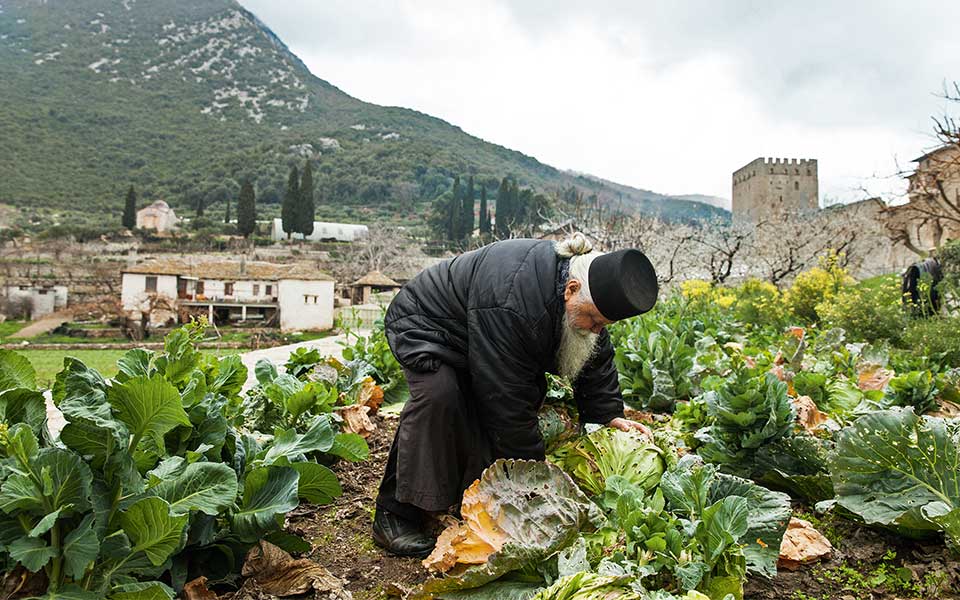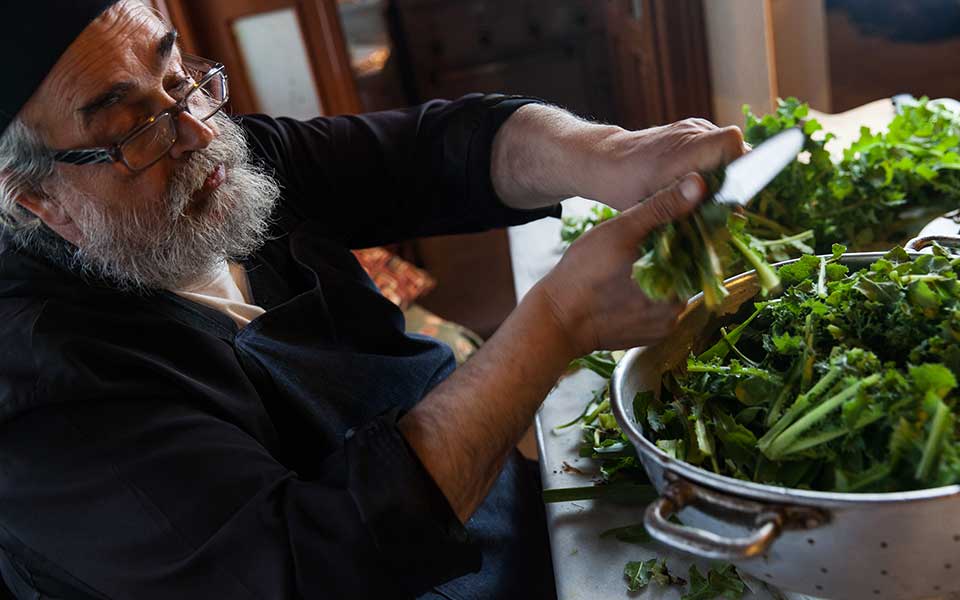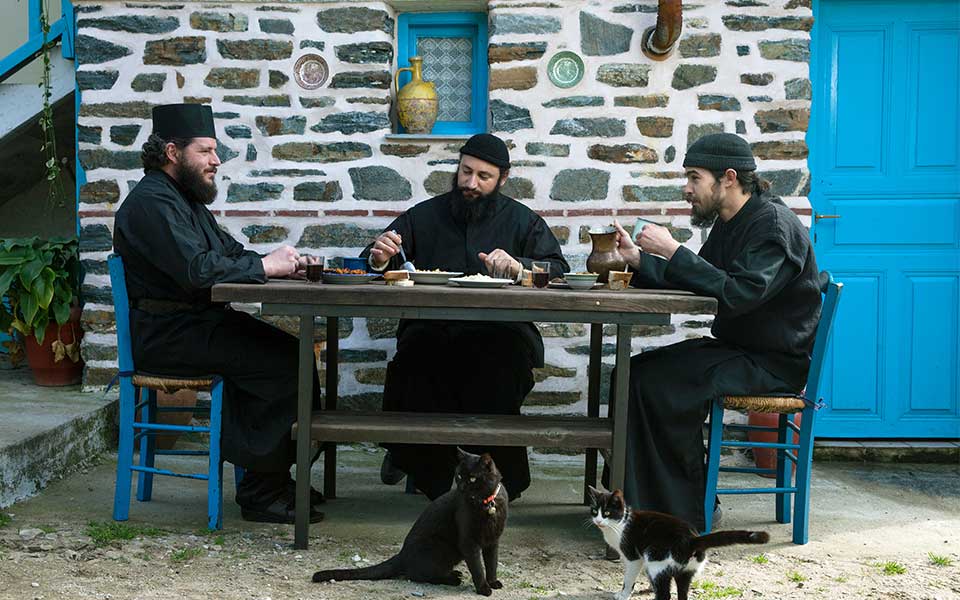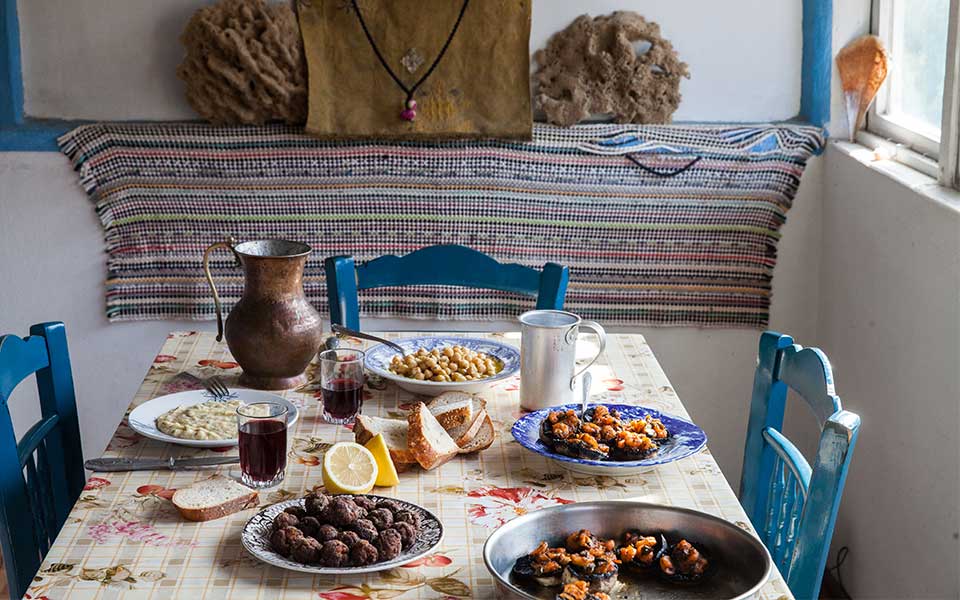Τhe gastronomy of Greece is rooted in the country’s history. Ever since the ancient days of banquets and symposiums, many factors have influenced the development of Greek cuisine. Religious celebrations and festivities, which were at the center of all ancient cultures, played an important role in Greece as well, where sacrificial animals were ritually prepared and ceremoniously eaten.
With the shift from pagan rituals to Christian practices, the ceremonial feasts changed, but the “experience” of feasting remained the same, relying on the same food items that have always been used. Even in the Christian practice of fasting – the abstinence from certain foods – we see the consumption of the same vegetables, legumes, cereals and fruits that were noted in the “Deipnosophistae,” the famed 3rd-c. AD account of Greek cooking written by the Greek rhetorician Athenaeus of Naucratis.
But how did fasting become so influential in Greek culture and cuisine? The fasting practices of the Greek Orthodox Church provide some clues.
Fasting and Early Christianity
Fasting is first mentioned in the Old Testament. During the time of Moses, the Jews fasted for the first Pascha, or Passover, which took place in Egypt. After two or three days, they sacrificed a lamb, whose blood they smeared on their doorways so that when the Angel of Death passed over their homes, their firstborn sons would be spared. After Moses led the people out of Egypt, they fasted in the wilderness for three days before Moses received the Ten Commandments.

© Dimitris Vlaikos

© Dimitris Vlaikos
In the New Testament, Christ fasted for forty days in the wilderness before starting his ministry. This period of fasting subsequently became a common practice, first under the apostles and then throughout early Christianity. In the Orthodox Church, it has retained its role as a form of ascesis, or spiritual self-discipline for the faithful. In Orthodox theology, the body and soul are inseparable. Therefore, whatever has to do with the body also has to do with the soul.
In the 4th century, one of the best-known Early Church Fathers, St John Chrysostom, wrote a homily on fasting that also mentions its medicinal benefits. He declared that “fasting is called the mother of bodily health.”
When referring to abstinence from food, he pointed out that fasting is a medicine and that over-indulging in food produces negative consequences: “When the body becomes sluggish, the soul undergoes damage, as the activities of the soul are determined by the condition of the body… Ailments and weakness of the body… come from great luxury and the love of pleasure. When we leave the table, we feel heavy from the great amount of food; our stomachs hurt, our head aches and our sleep is deep… Food in excess is not nourishment; rather, it can destroy our bodies.”
Orthodox Fasting (“Nistia”)
Just how does one fast in the Orthodox way? Fasting entails abstinence from meat, dairy products and fish – but not shellfish. There is also the strict fast, which is practiced on certain days of the year, where there is also abstinence from oil.
There are four major fasting periods in the Orthodox liturgical calendar: the Christmas Fast, lasting forty days from November 15 to December 24 (fish can be eaten up to December 17, except on Wednesdays and Fridays); the Fast of Lent, the forty days leading up to Holy Week and the week itself; the Fast of the Holy Apostles, which runs from All Saints’ Day (which depends on the date of Easter) up to the eve of the Feast of Saints Peter and Paul on June 28; and the Fast of the Dormition of the Virgin Mary, lasting from August 1 to August 15.
What’s more, every Wednesday and Friday throughout the year are fast days, except for certain dates that follow major feast days.

© Dimitris Vlaikos
Fasting and the Mediterranean Diet
How does this all tie in with Greek cuisine? In our day and age, much has been written about the health benefits of the Mediterranean diet. In 1998, the International Conference on the Mediterranean Diet, held in Cambridge, Massachusetts, gathered 50 nutrition scientists from a dozen different countries to define a healthy diet. They concluded that it was one high in fruits, vegetables, legumes, whole grains, fish, nuts and low-fat dairy products. They also emphasized the importance of using monounsaturated oils, mainly olive oil, and noted that the intake of trans fat from partially hydrogenated oils should be minimized.
Traditional Greek cuisine is rich in olive oil, vegetables, legumes, grains and fruit, and this is particularly true of dishes eaten during periods of fasting, although, of course, each fasting season brings its own traditional ingredients and recipes.
In the fast before Christmas, for example, there’s a special soup made from various legumes from the recent harvest period. These are all boiled together and served with nuts, raisins and honey.
During Lent, fresh vegetables from the late winter and early spring crops are used; as Easter approaches, these slowly give way to recipes with artichokes, spring onions, lettuce, broad beans, peas, leeks and herbs. One can also enjoy numerous dishes featuring squid, octopus, cuttlefish and a variety of shellfish, such as clams, mussels and shrimp.
Summer fasting periods are also rich in ingredients, as Greece produces a wide array of summer fruit and vegetables, as well as bountiful shellfish.
If you’d like to experience the flavors of Greek fasting cuisine when you’re dining out in Greece, then ask for ladera, a term describing dishes that are made with olive oil and contain no meat or dairy products.
More important than what you eat, however, is the chance to experience the Greek “theology” of food. Here, food is seen both as a source of life and as a way of achieving communication with God as well as our fellow man. The act of consuming food has always had deep social and spiritual implications in Greece, whether it be in the course of fasting or in the midst of feasting.











